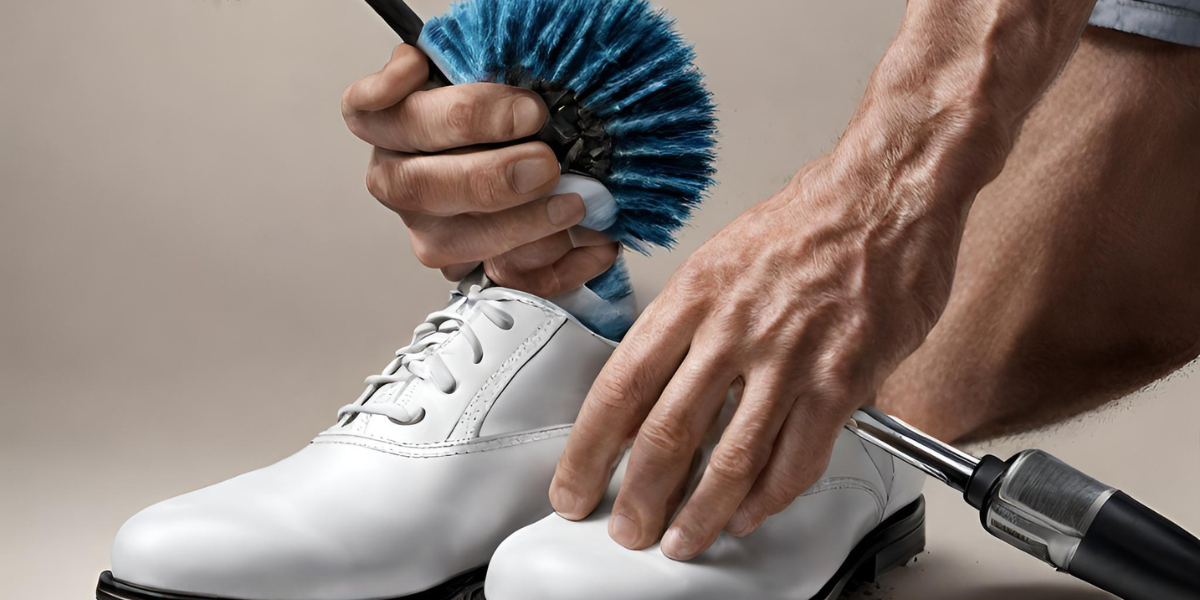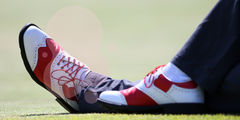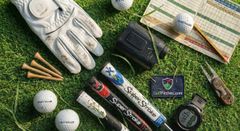Golf Shoe Cleaning Guide for Beginners

When it comes to perfecting your golf game, every detail matters—from the precision of your swing to the quality of your equipment. But there’s one often-overlooked factor that can make or break your performance on the fairway: your golf shoes.
That’s right, those dirt-caked, grass-stained foot soldiers you unceremoniously toss in your trunk post-game deserve more attention, specifically in the form of regular golf shoe cleaning.
The state of your golf shoes can significantly affect not only your comfort but also your performance on the course. In a sport where the margin for error is paper-thin, the foundation you stand on matters. A lot. That’s why we’ve put together this comprehensive guide to help beginners understand the ‘why,’ ‘when,’ and ‘how’ of golf shoe cleaning.
So, if you’re searching for tips on golf shoe cleaning that can help you maintain not just your gear but also your edge in the game, keep reading. We promise, your feet—and your scorecard—will thank you.
Table of Contents
- Golf Shoe Cleaning Kit
- The Step-by-Step Golf Shoes Cleaning Process
- When Should You Clean Your Golf Shoes?
- Common Mistakes to Avoid When Cleaning Golf Shoes
Golf Shoe Cleaning Kit
Your Arsenal for Impeccable Golf Shoe Cleaning Before you roll up your sleeves, let’s make sure you’ve got the right equipment. This section focuses on the must-have tools and supplies to make your golf shoe cleaning process not just effective, but downright enjoyable.  Soft-Bristled Brush
Soft-Bristled Brush
Ideal for gently brushing off loose dirt and debris, a soft-bristled brush is an absolute essential for golf shoe cleaning, especially for delicate materials like leather.
Top Picks
- Reshoevn8r Soft Bristle Brush: Specifically designed for shoe cleaning.
- Horsehair Shoe Brush: Natural, softer bristles make it ideal for fine leather.
 Medium-Bristled Brush
Medium-Bristled Brush
Great for synthetic or more resilient materials, a medium-bristled brush will help you scrub off those stubborn mud spots without damaging the golf shoe.
Top Picks
- Jason Markk Standard Shoe Cleaning Brush: Well-balanced for effective golf shoe cleaning.
- KIWI Shoe Brush: Versatile and trusted by many.
 Microfiber Cloth
Microfiber Cloth
Perfect for applying cleaners and for a gentle scrub, the microfiber cloth is excellent for all kinds of materials and doesn’t cause scratches.
Top Picks
 Specialized Cleaners
Specialized Cleaners
Different golf shoe materials call for specific cleaners. They help to maintain the shoe’s material while also removing dirt and grime effectively.
Top Picks
- Leather: Lexol Leather Cleaner or Bickmore Bick 4
- Synthetic: Crep Protect or Simple Green
- Fabric/Mesh: Jason Markk or Sof Sole Cleaner
 Suede Eraser
Suede Eraser
For any suede areas or scuffs on leather, a suede eraser can lift dirt and marks without causing harm.
Top Picks
- Kiwi Suede & Nubuck Eraser
- Shacke Suede & Nubuck 4-Way Brush Cleaner
 Shoe Trees
Shoe Trees
Helpful in maintaining your shoe’s shape as it dries, shoe trees are especially beneficial for leather shoes.
Top Picks
- Stratton Cedar Shoe Tree
- FootFitter Cedar Shoe Tree
 Waterproofing Spray
Waterproofing Spray
Once your shoes are clean and dry, a waterproofing spray will help protect against future encounters with mud and water.
Top Picks
- Scotchgard Fabric & Upholstery Protector
- Crep Protect Ultimate Rain & Stain Spray
 Conditioner
Conditioner
For leather shoes, a conditioner will help keep the material soft and supple, extending its lifespan.
Top Picks
- Saphir Renovateur
- Leather Honey Conditioner
 Bags or Storage Boxes
Bags or Storage Boxes
For proper storage after cleaning to avoid dust accumulation and potential damage.
Top Picks
- LotFancy Shoe Bags are durable and perfect for storing and even traveling.
Arming yourself with the right tools and supplies is the first step in mastering the art of golf shoe cleaning. Once you’ve got these essentials in your cleaning kit, you’re well on your way to ensuring that your golf shoes stay as stellar as your swing.
The Step-by-Step Golf Shoes Cleaning Process
Step1 : Preliminary Dusting
- Tools Needed: Soft-bristle brush or an old toothbrush
Before diving into a deep clean, remove any loose dirt, mud, or sand from your shoes. Use a plastic or rubber bristle brush for this task.
- Remove the spikes: If your golf shoes have removable spikes, take them off using a spike wrench to get to the dirt hidden underneath.
- Brush off the loose dirt: Using a soft-bristle brush or an old toothbrush, brush away the loose dirt and debris from the sole and upper parts of the shoes.
NB: Avoid tapping the shoes together to remove dirt; this could cause micro-fractures in the shoe soles over time.
Removing Dirt from Different Golf Shoe Materials
- Leather: Use a soft-bristled shoe brush or an old toothbrush to gently remove dirt and debris.
- Synthetic: A more resilient material allows you to use a stiffer brush.
- Fabric/Mesh: Use a soft-bristled brush but be extra gentle to avoid fraying the material.
Step 2: Washing Golf Shoes to Remove The Grime
Washing your golf shoes is not just a superficial chore—it’s an absolute necessity that has a direct impact on your performance.
How often should you wash your golf shoes? Simply put, a basic wipe-down after each game is essential. But when it comes to deep washing, a monthly routine suffices for casual players, while avid golfers should aim for every two weeks.
Regular washing can dramatically extend the life of your shoes and save you money in the long run.
But here’s the kicker: Your golf shoes need light cleaning after every game. Think of it as damage control, a way to prevent dirt and grime from becoming lifelong tenants.
It’s especially important that you act quickly if your golf shoes end up wet or muddy during a game.
Remove excess mud immediately with a golf tee or a brush. If you can, rinse them off with water at the clubhouse or as soon as you get home.
If the shoes are wet, use newspaper to soak up the moisture. Put the newspaper inside the shoes to help them keep their shape while drying.
The Washing Process
-
Remove the laces and insoles if they are removable. This allows for a more thorough cleaning. Place them aside; we’ll address those shortly.
-
Lightly rinse the shoe’s exterior to dampen it. This prepares the surface for a more effective washing.
-
Use a cloth or a soft-bristled brush to apply the cleaner gently. For leather, perform circular motions; for synthetic materials, you can be a tad more vigorous; and for fabric or mesh, a gentle brushing action is key.
-
Dig in with a scrubbing brush but remember—leather needs a soft touch, synthetic can handle a firmer scrub, and fabric should be treated as if it’s royalty: with extreme care.
-
Gently rinse off the cleaning solution. Leather should be wiped with a wet cloth, synthetic can endure a light spray of water, and fabric should be dabbed gently with a moist towel.
-
Don’t forget those laces and insoles. A simple soak in warm soapy water can rejuvenate them. Rinse and lay them out to dry naturally.
-
For leather shoes, mix a few drops of saddle soap or specialized leather cleaner like Lexol in warm water.
-
For synthetic golf shoes, a mild detergent solution works wonders. A product like Crep Protect is also recommended.
-
When washing golf shoes, always remember—gentleness is key. Over-scrubbing can damage the integrity of the shoe, and that’s the last thing you want. If your shoes have removable insoles, take them out and clean them separately for an ultra-fresh feel.
-
White vs. Dark Colors: If you’re dealing with white shoes, avoid bleach or overly aggressive detergents, which can deteriorate the material. For dark-colored shoes, a mild detergent ensures that the color remains vibrant.
-
Water Temperature: Always opt for cold to lukewarm water. Hot water can damage the shoe’s structure and adhesives.
-
Washing Machine Taboo: While it may seem tempting, never throw your golf shoes in the washing machine. The vigorous action can compromise the shoe’s construction and affect its longevity.
Step 3: Drying Your Golf Shoes
You’ve taken the time to meticulously wash your golf shoes, so don’t ruin it all by drying them improperly.
Wet shoes can be a breeding ground for bacteria and mold. This not only leads to unpleasant odors but can also degrade the material of the shoe over time.
What Not to Do
- No Direct Sunlight: This might seem like a quick fix, but direct sunlight can fade the color and degrade the material.
- No Hair Dryers: Don’t be tempted! The intense heat can cause warping and material breakdown.
- No Radiators or Heaters: These are just as bad as hair dryers for the same reasons.
How to Dry Golf Shoes After Cleaning
-
Before you even think about drying, use a dry cloth or towel to wipe down the surface of the shoe. For the interior, stuff it with newspaper or dry cloth to absorb the moisture.
-
A shoe tree, particularly one made from cedar, can be a lifesaver. Not only does it maintain the shape of the shoe, but cedar also has moisture-absorbing and odor-fighting properties.
-
Place the shoes in an upside-down position to allow any trapped moisture to escape.
-
If you want to speed up the drying process, use a fan. Place the shoes in a position where they receive a gentle airflow. This promotes evaporation without risking damage.
When Should You Clean Your Golf Shoes?
Timing is everything when it comes to maintaining your golf shoes. Whether it’s a quick post-round brush down or a seasonal deep clean, knowing when to clean your shoes is just as crucial as knowing how.
Immediate Post-Round Cleanup
Just as you wouldn’t leave your clubs dirty after a round, your golf shoes also deserve immediate attention. Mud, water, and grass can quickly deteriorate your shoe material if left unattended.
Use a golf shoe cleaner brush to remove any loose dirt or grass from the outsole and sides. If you have access to a golf shoe cleaning station at the course, even better! Use it to your advantage for an effective, on-the-spot cleaning.

The Weekly Deep Clean
Routine golf shoe maintenance is the key to longevity. No matter how diligent you are post-round, a deeper clean is needed periodically. This is especially true if you’re a frequent golfer.
This is the time to whip out your specialized golf shoe cleaning kit. A weekly deep clean is the best way to clean golf shoes, particularly if they’re made of leather.
Use golf shoe cleaners specifically designed for the type of material your shoe is made of. Clean leather golf shoes with a leather-specific cleaner like Lexol or Saphir, followed by conditioning to maintain suppleness.

Seasonal Overhaul
At the end of every golf season, a complete cleaning overhaul is required to keep your golf shoes ready for the coming year.
This is when you should get the best golf shoe cleaner for those scuff marks, specialized cleaning agents for the outsole, and possibly even replacement spikes.
Your seasonal overhaul should be the most thorough cleaning your shoes get, leaving them looking almost as good as new. Don’t skimp on any step!

Event-Triggered Cleaning
- After playing in muddy conditions
- Spilling food or beverages on your shoes
- After walking through water hazards
In such cases, immediate cleaning is advisable. Again, use a golf shoe cleaner brush and specialized golf shoe cleaners to address the mess right away. You don’t want to leave any room for stains to set or for water to seep into materials, causing long-term damage. 
Emergency Cleaning for White Golf Shoes
White golf shoes require special care due to their propensity for showing stains more clearly. An emergency clean is needed whenever they catch noticeable marks or stains.
For emergency cleaning, a white golf shoe cleaner like Jason Markk’s Quick Wipes can be a lifesaver. These are designed to lift stains and brighten the material, making your white golf shoes look pristine again.

Common Mistakes to Avoid When Cleaning Golf Shoes
 Ignoring the Material
Ignoring the Material
Your golf shoes are not just another pair of sneakers. They can be made of leather, synthetic materials, or even fabric and mesh. Each type needs a different cleaning approach.
- Leather: A soft-bristled brush and a leather-specific cleaner like Lexol or Bickmore Bick 4 are your friends.
- Synthetic: A more durable material like synthetic can handle something a bit more abrasive, like a medium-bristle brush and a gentle detergent.
 Rushing the Drying Process
Rushing the Drying Process
We get it. You want those shoes dry, and you want them dry now. But patience is a virtue when it comes to golf shoe cleaning.
- What To Do: Air dry your shoes in a well-ventilated area. If you’re dealing with leather, a cedar shoe tree is invaluable for preserving their shape.
Don’t Do This: Never use direct heat sources like hair dryers or radiators. These can cause the glue to melt and your shoes to lose their shape.
 Using the Wrong Cleaners
Using the Wrong Cleaners
While it’s tempting to grab whatever cleaning agent is closest, the wrong cleaner can cause more harm than good.
- What To Do: Use specialized cleaners for your specific shoe material. Jason Markk is great for fabric and mesh, while a specialized white shoe cleaner like Pink Miracle can keep those white golf shoes sparkling.
Don’t Do This: Steer clear of multi-purpose cleaners that aren’t designed for shoes, as they can discolor or degrade the material.
 Skipping the Insoles and Spikes
Skipping the Insoles and Spikes
The insoles and spikes are the unsung heroes of your golf shoes, providing comfort and grip, respectively.
- What To Do: If your insoles are removable, take them out and clean them separately. Spikes can usually be cleaned with a toothbrush and some warm soapy water.
Don’t Do This: Never leave your insoles soggy or your spikes muddy. This could lead to odors and even fungal growth—yuck!
 Over-Saturating Your Shoes
Over-Saturating Your Shoes
The temptation to drench those dirty shoes in water or cleaner is real, especially after a long day on a muddy golf course.
- What To Do: Less is more. For leather, a damp cloth is often all you need, along with a leather conditioner like Leather Honey.
Don’t Do This: Avoid soaking your shoes, especially if they’re leather. Excessive moisture can cause leather to crack and synthetic materials to weaken.
 Ignoring Color
Ignoring Color
Dark and light-colored shoes each have their own needs when it comes to golf shoe cleaning.
- What To Do: For white shoes, avoid bleach or harsh detergents. For darker shoes, stick to mild detergents to maintain the color.
Don’t Do This: Never use a dark polish on a light-colored shoe, and vice versa. It’s a rookie mistake you’ll regret!



